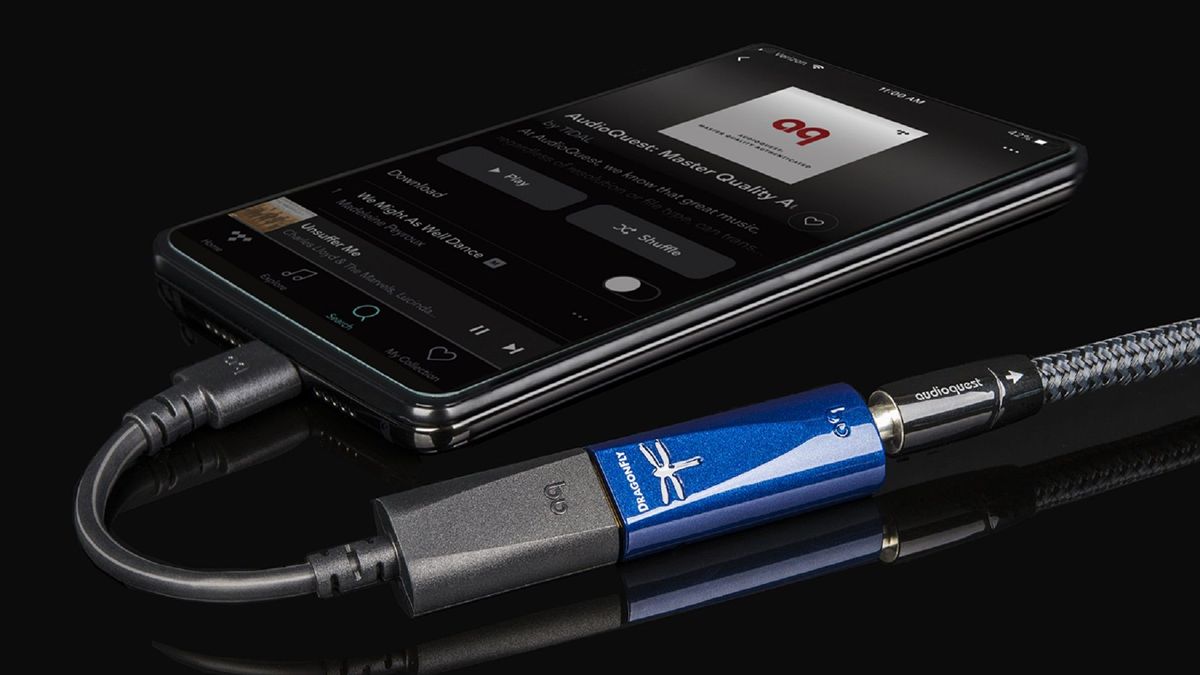This is a review and detailed measurements of the AudioQuest Dragonfly Cobalt portable DAC and headphone amplifier ("dongle"). It is on kind loan from a member and costs US $300.
The Dragonfly Cobalt dates way back to when these dongles came in the form of USB flash Thumb drives:
View attachment 127584
This makes it easy to connect to desktop and laptop computers (assuming yours has such USB connection) but needs a chunky adapter to connect to USB-C on phones and tablets. While I did not have it, a custom one comes with Cobalt which makes a secure connection.
The dragonfly series comes in a few colors, each with a different performance level. The Cobalt is the top of the line as indicated by sky high price for such a product. An ESS ES9038Q2M DAC chip is used internally as to indicate high performance. We will check for this.
 AudioQuest Dragonfly Cobalt Measurements
AudioQuest Dragonfly Cobalt Measurements
I was pleased that the Cobalt introduces itself to Windows in a way that I could use my ASIO interface layer and as such, run my full suite of tests (which half the time I can not). Let's start with our dashboard:
View attachment 127585
Looks pretty bad. It actually looked far worse before I subtracted 1 dB from the digital input signal. Without it, it was heavily clipping with SINAD dropping to below 30! As it is, the Cobalt turns in one of the worse distortion ratings as encapsulated in SINAD that I have tested:
View attachment 127586
The one to its right, Speaka, is one of the first dongles I ever tested. I think it cost just $30 or something. Sweeping the input level we see the full range of performance:
View attachment 127588
You can see that performance is best when the output is low and progressively gets worse until it hard clips. Just unacceptable.
Surprisingly, noise level is quite good:
View attachment 127589
Distortion is the problem as we see in multi-tone test yet again:
View attachment 127590
DAC filter is slow, ala MQA style:
View attachment 127591
I don't know how they consider 6 dB droop at 20 kHz acceptable. Testing with a square wave shows the "benefit" or no pre-ringing but with clipping as the filter rings:
View attachment 127593
Notice the flattening of the tops of oscillations. And that is at -2 dBFS input signal!
Linearity test is nailed showing once again, there is some good in this DAC that is obscured by other parts:
View attachment 127592
Jitter test shows very good results for a dongle as well:
View attachment 127594
Dragonfly Cobalt Headphone Amplifier Measurements
Most important measurement for these dongles is power. Phones and tablets often struggle to drive fancy headphones so the job of these products is to remedy that. Let's start with 300 ohm load:
View attachment 127595
A distorção aumenta muito cedo, começando em uma fração de miliwatt - totalmente inaceitável. Felizmente, porque o nível de saída atinge 2 volts, temos uma boa potência para um dongle:
View attachment 127596
O desempenho cai muito mais com uma carga de 32 ohm:
View attachment 127597
View attachment 127598
Compare os 26 miliwatts com
o THX Onyx recentemente revisado . O Onyx produz 132 miliwatts em comparação com apenas 26 para Cobalt e faz isso com uma distorção muito menor.
Testes de audição de cobalto de libélula
O Cobalt não teve problemas para conduzir meu Sennheiser HD-650 a bons níveis de volume e autoridade. Não havia muito do que reclamar no contexto de um dongle portátil. Mudar para o fone de ouvido Ether CX, porém, foi uma situação completamente diferente. Aumentar o nível além de um sussurro causaria distorção nas notas graves. No volume máximo, a saída foi severamente distorcida e inutilizável.
Conclusões
Como líder da categoria, a AudioQuest aproveita sua posição de mercado para precificar o Dragonfly Cobalt nas alturas. Infelizmente, ele passa a fornecer um produto altamente distorcido que tem pouca capacidade de acionar fones de ouvido de baixa impedância. Você pode comprar muitos produtos por um terço de seu preço, dessa forma superando-o. Se você quer um nome de marca, pegue o THX Onyx que lava o chão com ele. Quem projetou o amplificador de fone de ouvido neste produto precisa voltar para a faculdade de engenharia ou prestar atenção no que o concorrente está enviando. Na verdade, ele precisa fazer as duas coisas.
Embora com fones de ouvido de alta impedância, o AudioQuest Dragonfly Cobalt tenha um desempenho subjetivo aceitável, ele falha de tantas outras maneiras que não posso recomendá-lo.
------------
Como sempre, perguntas, comentários, recomendações, etc. são bem-vindos.
Quaisquer
doações são muito apreciadas usando
: https://www.audiosciencereview.com/forum/index.php?threads/how-to-support-audio-science-review.8150/

